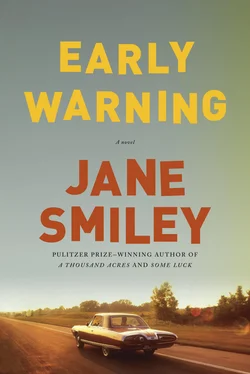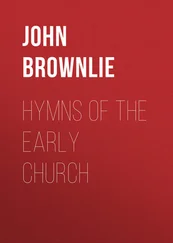Jane Smiley - Early Warning
Здесь есть возможность читать онлайн «Jane Smiley - Early Warning» весь текст электронной книги совершенно бесплатно (целиком полную версию без сокращений). В некоторых случаях можно слушать аудио, скачать через торрент в формате fb2 и присутствует краткое содержание. Год выпуска: 2015, Издательство: Knopf, Жанр: Современная проза, на английском языке. Описание произведения, (предисловие) а так же отзывы посетителей доступны на портале библиотеки ЛибКат.
- Название:Early Warning
- Автор:
- Издательство:Knopf
- Жанр:
- Год:2015
- ISBN:нет данных
- Рейтинг книги:5 / 5. Голосов: 1
-
Избранное:Добавить в избранное
- Отзывы:
-
Ваша оценка:
- 100
- 1
- 2
- 3
- 4
- 5
Early Warning: краткое содержание, описание и аннотация
Предлагаем к чтению аннотацию, описание, краткое содержание или предисловие (зависит от того, что написал сам автор книги «Early Warning»). Если вы не нашли необходимую информацию о книге — напишите в комментариях, мы постараемся отыскать её.
, a national best seller published to rave reviews from coast to coast.
Early Warning — читать онлайн бесплатно полную книгу (весь текст) целиком
Ниже представлен текст книги, разбитый по страницам. Система сохранения места последней прочитанной страницы, позволяет с удобством читать онлайн бесплатно книгу «Early Warning», без необходимости каждый раз заново искать на чём Вы остановились. Поставьте закладку, и сможете в любой момент перейти на страницу, на которой закончили чтение.
Интервал:
Закладка:
Finally, Paul said, “I’m s—”
Claire stood right in front of him and said, “I don’t care.” Then, “Dinner will be ready in an hour.” She went back to peeling potatoes.
She served at six-thirty; the chicken was a little dry, the mashed potatoes were good, and cleanup was easy. At eight, they watched Barney Miller , and at nine, they watched Soap. Brad came in and out with questions about his homework, and at nine-thirty, he was told to go to bed. Gray was, Claire suspected, hiding out in his room. At ten, they watched the news, and then Paul stood up from his easy chair and said, “Well, I’m going to bed. I—” But she must have had a look on her face, so he stopped, and headed up the stairs. She turned off the TV. In the late-night quiet, she glanced around and decided that she hated every piece of furniture, and she was not going to take a single one with her to the apartment. What was that furniture called that those Perronis had in California? Oh, right, Mission style, of course. She would start there. Paul appeared at the bottom of the stairs. She looked at him. His first utterance would be a final test.
He said, irritably, “It’s late. I have to be at the hospital by—”
How many times had he said that over the years? He was a very prompt man. But he had failed to pass the test. He had gone on with his life, with their lives, out of habit, not daring to recognize that all was changed.
She said, “I’m getting a divorce.”
He said, “I won’t allow that.”
And then she simply laughed. She saw his fists clench, and she saw him notice and unclench them. She said, “I’ll sleep on the couch tonight.”
“What will you tell the boys?” Now his lips twisted, and he looked as undecided as Claire had ever seen him, torn between remorse and rage.
“I’ll tell them I slept on the couch.”
He stared at her, then turned away.
Little had she known what a pleasure it would turn out to be, telling the truth at last.
1980

WHEN JOE GOT the flu after Christmas, he was in bed for a week, throwing up, lost in a fever of 103 or more, and waking at odd times from dreams about snow. And there was plenty of snow — Lois and Minnie let D’Ory and D’Onut in the house. After his fever was gone, he slept for another week, and when he finally woke up, on January 7, he had lost ten pounds and was as hungry as a hog. Lois thought this was funny, and made his favorite dishes for a few days; all in all, Joe was glad that he’d gotten sick in the middle of winter and that no one else came down with it. Apparently, Annie, who was home for a few days, oversaw the quarantine and would not under any circumstances let Lois go to the doctor and get some antibiotics, not even to be safe, because flu was a virus and that was that. She even called a couple of times after she went back to her job at a hospital in Milwaukee, to make sure that Lois wasn’t “going for the cefaclor behind her back.”
“So bossy,” exclaimed Lois, but they all knew she was right.
When he managed to get himself into the Volkswagen and go into town for lunch, he was the only person in the Denby Café who wasn’t up in arms about Carter’s grain embargo. Marsh Whitehead had a paper with him, not The Des Moines Register or The Usherton Post , but The Christian Science Monitor , which had an article by two men from over in Kansas about why the embargo would fail. Joe read it over while he was drinking his coffee and listening to all the other farmers bitching about it. Here they’d thought Carter — well, peanuts, what kind of a crop was that? But hadn’t his sister ridden a tractor back in December of ’77, two years ago, when those farmers protested? And Russ Pinckard said, “Well, I didn’t see anyone from around here down there at Terrace Hill, driving their John Deeres over the lawn, did I?”
According to the article, you could tell by the thickness of tree rings how much rain there was in the course of a year, which Joe knew, and, furthermore, these rings went in a twelve-year cycle: for six years, the rings were fatter, which meant more rain, and then for the next six years, thinner rings, less rain. Those years when the Russkies needed more grain because of less rain were over, so there was no reason to think they needed to import much this year. In addition, indications were that they had plenty on hand, left over from ’78, which they were hiding in brand-new and very enormous grain-storage facilities.
Joe looked up and said, “Why is he having a grain embargo anyway?”
“Oh, you were sick as a dog,” said Marie. “Lois told me all about it.”
“Well, I guess they invaded Afghanistan,” Russ Pinckard said, “wherever that is!”
“Kinda like us invading Mexico,” said Marsh Whitehead. “Piece I read said Carter should leave ’em alone, they’re gonna regret it soon enough without us lifting a finger.”
George, who was manning the register, looked up, and Marie looked over at him. George almost never said anything, but now he said, “You think he wants them to call him a sissy all over again? Those folks in Iran pulled his pants down; now the Russkies are doing the same thing.” Everyone shut up at the reference to the Iran hostages — it was something like two months now. The women and some minorities had been released, but there were still fifty-two men stuck there. Forgetting about them had been another privilege of his illness.
“And we got to pay,” said Russ Pinckard. No one rose to the bait; everyone knew that Carter’s response to the crisis was a ticklish issue. Russ looked at Joe. “You pay any attention to the markets lately? Surely you weren’t that sick.”
Joe shrugged. “I thought it was the middle of winter.”
“Well,” said Marsh Whitehead, “don’t have a heart attack when you do, because prices are way, way down. He suspended trading for a couple of days right after the embargo, but when they opened again, the price dropped as far as it could go, and it still hasn’t recovered. Best thing I think we can do this year is—”
“Shut the place and take off for Florida,” said Russ Pinckard.
Everyone laughed, but not cheerfully.
Ricky Carson, who had just come in and sat himself at the counter, said, “That’s where Dickie Dugan went. They got themselves a lemon grove down there by Tampa somewhere.”
At this, everyone fell silent again. Life surely was unfair if the Dugans were thriving.
A couple of weeks later, Reagan got in trouble for telling a joke that Joe thought was harmless enough—“How do you tell the Polish one at a cockfight? He’s the one with the duck. How do you tell the Italian? He’s the one who bets on the duck. How do you tell when the Mafia is there? The duck wins.” A lot of people went bananas, though no one at the Denby Café. In the New Hampshire debate, which Joe watched on television, Joe wasn’t impressed by him until he got to the grain issue — when he said that Carter’s move was “for domestic consumption and it actually hurt the American farmer more than the Soviet Union,” Joe had to agree, and then when he said that “there could be a confrontation down the road if they continue,” he had to agree with that, too. Of course, Reagan wasn’t a serious candidate, but he was pleasant — what he said about Carter came out in a genial way, as if he were chatting in your living room or something. Yes, Carter did more or less dare the Russians to cross the Afghan border, and then when they took his dare, he didn’t do a thing about it, and how could he? Maybe no one in Iowa, or in Washington, either, was quite sure where Afghanistan was. At any rate, the Russkies took Carter by surprise and everyone knew it.
Читать дальшеИнтервал:
Закладка:
Похожие книги на «Early Warning»
Представляем Вашему вниманию похожие книги на «Early Warning» списком для выбора. Мы отобрали схожую по названию и смыслу литературу в надежде предоставить читателям больше вариантов отыскать новые, интересные, ещё непрочитанные произведения.
Обсуждение, отзывы о книге «Early Warning» и просто собственные мнения читателей. Оставьте ваши комментарии, напишите, что Вы думаете о произведении, его смысле или главных героях. Укажите что конкретно понравилось, а что нет, и почему Вы так считаете.











